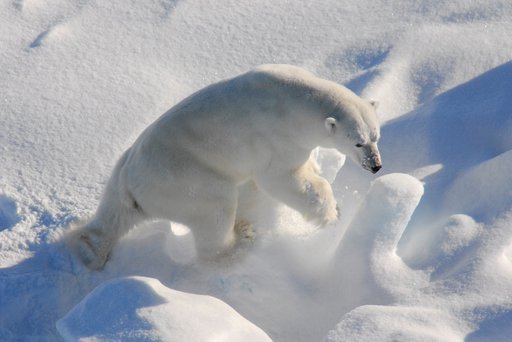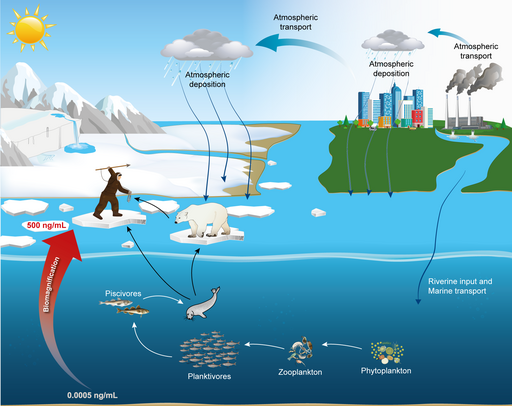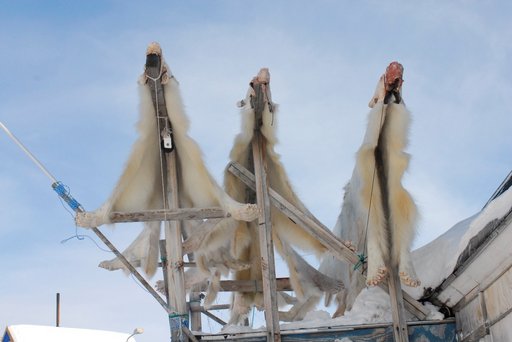Alarmingly high PFAS levels in the populations of Greenland, the Faroe Islands, Denmark and the UK
New research from Aarhus University show the need for an international effort to limit global pollution by PFAS. The substance inhibits the immune system and can, thus, increase the risk of infections and cancer, and PFAS can reduce the effect of vaccination programmes against e.g. tetanus, diphtheria, influenza and COVID-19.

The hunting community in Ittoqqortoormiit (Scoresby Sound), Northeast Greenland, has some of the world's highest concentrations of PFAS in their blood, even though they live far away from sources of contamination with per- and polyfluoroalkyl substances (PFAS).
PFAS is used in almost all industries and is found in many products such as textiles, carpets, shoes, food packaging, cosmetics, fire foam and pesticides.
The substances are long-range transported to the Arctic via the atmosphere and ocean currents. When they are released to the environment, PFAS is bio-magnified through the food chain. Predators at top of the food chain, such as ringed seals, toothed whales and polar bears therefore contain high PFAS concentrations, and the high levels in the indigenous population of East Greenland are hence primarily originating from their food.
The study, which has just been published in the prestigious journal Lancet Planetary Health, shows that 92% of residents in Ittoqqortoormiit have far more PFAS in the body than the European Food Safety Authority (EFSA) recommends to avoid damage to the immune system.
In addition, 86% of the inhabitants have blood values that are higher than EFSA's threshold value for serious risk of damage to the immune system.

Lacking knowledge about Danish sources
In Denmark, on the Faroe Islands and the UK, PFAS concentrations in the population's blood are slightly lower in Greenland, but still too high. So here too, there is a great risk of damage to the immune system. The population of the Faroe Islands eat pilot whales, which also have high levels of PFAS.
"In Denmark, and most other places in Europe, we lack a thorough knowledge about PFAS pollution. For example, we don't know the levels in fish, grazing animals, including the game that hunters shoot", says Professor Christian Sonne, Department of Ecoscience and Arctic Research Centre, Aarhus University, who lead the study.
For instance, cattle that graze close to the site for fire drills in Korsør showed particularly high values of PFAS, and it was detected in members of the local cattle guild who ate the cattle.
A global problem

The recently published study shows that the pollution with PFAS is critical in many parts of the world, and Christian Sonne emphasizes that national and regional legislation must go hand in hand with the UN's sustainable development goals and the Stockholm Convention in order to phase out PFAS.
"If measures are not taken quickly, such as a ban on PFAS and the use of alternatives to PFAS, pollution of the environment will continue to threaten public health around the world", says professor Christian Sonne.
On 7 February 2023, the European Chemicals Agency published a proposal to limit the production, use and marketing of more than 10,000 PFAS substances in the EU. The purpose of the proposal is to limit the spread of PFAS substances. As a rule, the use of PFAS will be banned in general in EU, but unfortunately not in various pesticides. Similar actions are under way in the US.
The researchers behind the study show that PFAS levels in the blood are generally higher in the European countries and North America compared to countries in Asia and Africa. The highest concentrations are found (in descending order) in Greenland, the Faroe Islands, Denmark, Australia, Sweden, Norway, Malaysia, USA, Taiwan, Greece, Poland, Spain and Iceland.
Additional information | |
| We strive to ensure that all our articles live up to the Danish universities' principles for good research communication(scroll down to find the English version on the web-site). Because of this the article will be supplemented with the following information: | |
| Funding | DANCEA (Danish Cooperation for Environment in the Arctic) |
| Read the scientific article in The Lancet | Assessment of exposure to perfluorinated industrial substances and risk of immune suppression in Greenland and its global context: a mixed-methods study |
| Contact | Christian Sonne, Professor, Department of Ecoscience and Arctic Research Centre, Aarhus University, email: cs@ecos.au.dk; phone: +45 3078 3172 Rune Dietz, Professor, Department of Ecoscience and Arctic Research Centre, Aarhus University, email: rdi@ecos.au.dk; phone: +45 2125 4035. Kim Gustavson, Senior researcher, Department of Ecoscience and Arctic Research Centre, Aarhus University, email: kig@ecos.au.dk; phone: + 45 3018 3113. |
